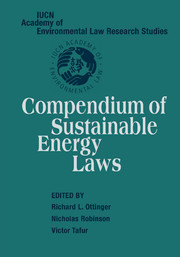Book contents
- Frontmatter
- Contents
- Acknowledgments
- Introduction
- I WORLD ENERGY ASSESSMENT
- II INTERNATIONAL AGREEMENTS
- III INTERNATIONAL LAW DECLARATIONS AND OTHER SOFT LAW INSTRUMENTS
- IV ACTION PLANS AND MULTILATERAL OPERATION RECOMMENDATIONS
- V SELECT REGIONAL INTERNATIONAL ENERGY AGREEMENTS
- VI SELECT NATIONAL LEGISLATION ILLUSTRATIVE OF SUSTAINABLE ENERGY LAW INNOVATIONS
- Index
Introduction
Published online by Cambridge University Press: 03 May 2010
- Frontmatter
- Contents
- Acknowledgments
- Introduction
- I WORLD ENERGY ASSESSMENT
- II INTERNATIONAL AGREEMENTS
- III INTERNATIONAL LAW DECLARATIONS AND OTHER SOFT LAW INSTRUMENTS
- IV ACTION PLANS AND MULTILATERAL OPERATION RECOMMENDATIONS
- V SELECT REGIONAL INTERNATIONAL ENERGY AGREEMENTS
- VI SELECT NATIONAL LEGISLATION ILLUSTRATIVE OF SUSTAINABLE ENERGY LAW INNOVATIONS
- Index
Summary
This volume contains the first compendium of legal instruments ever prepared on the emerging field of the “law of sustainable energy.” Admittedly, no such field of law exists today, but it is fast emerging and will of necessity become a recognized legal discipline. Energy issues were not much featured in Agenda 21, adopted by the United Nations Conference on Environment and Development in 1992. In contrast, the Johannesburg Plan of Implementation adopted in 2002 at the United Nations World Summit for Sustainable Development, featured energy efficiency and energy choice issues as a key element of sustainable development.
The World Energy Assessment (WEA) definies “sustainable energy” as follows: “Energy produced and used in ways that support human development in all its social, economic and environmental dimensions is what is meant by sustainable energy” (page 3, World Energy Assessment: Energy and the Challenge of Sustainability). The WEA was prepared for the United Nations Department of Economic and Social Affairs, the UN Development Programme, and the World Energy Council. Assembled by Professor Thomas Johansson, it is an outstanding survey of worldwide energy supply and demand issues. Before there can be a recognized field of sustainable energy law, there needs to be a global view of the energy problemmatique. The WEA provides that worldview, and its “Overview” chapter sets forth that understanding as the filter for the selection of the legal instruments that are published together here.
At present, energy supply is governed essentially by national laws.
- Type
- Chapter
- Information
- Compendium of Sustainable Energy Laws , pp. x - xiiPublisher: Cambridge University PressPrint publication year: 2005

